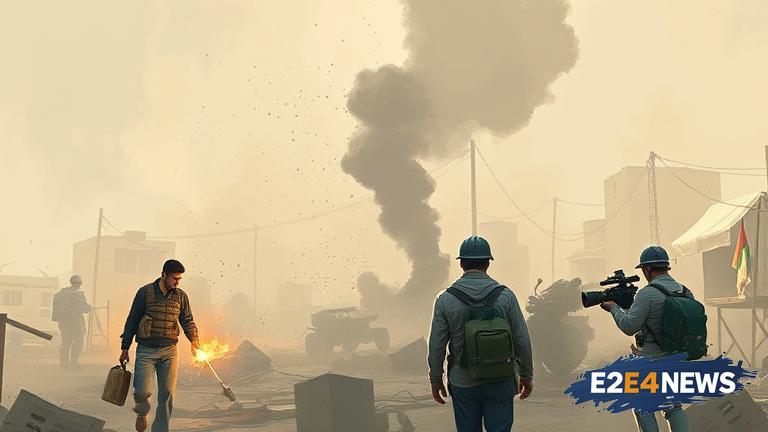The Israel-Gaza conflict has once again taken a devastating turn, with a recent hospital attack resulting in the loss of life of several journalists. This tragic event has sent shockwaves throughout the international community, highlighting the dire need for increased protection of media personnel in conflict zones. The attack, which occurred at a hospital in Gaza, has been widely condemned by human rights organizations and journalistic communities worldwide. The incident has sparked a heated debate about the safety of journalists in war-torn areas and the measures that can be taken to prevent such tragedies from occurring in the future. The journalists who lost their lives in the attack were reportedly covering the conflict in Gaza, providing vital coverage of the situation on the ground. Their bravery and dedication to their craft have been praised by colleagues and industry leaders, who are now calling for greater protections to be put in place. The Israeli government has faced criticism for its handling of the situation, with many accusing the military of disregarding the safety of civilians and journalists. The Gaza hospital attack is just the latest example of the dangers faced by journalists in conflict zones, where they often find themselves caught in the crossfire. In recent years, there has been a disturbing trend of increased violence against journalists, with many being targeted or killed while covering conflicts around the world. The international community has been urged to take action to protect journalists and ensure that those responsible for such attacks are held accountable. The United Nations has condemned the attack, calling for a thorough investigation into the circumstances surrounding the incident. The organization has also reiterated its commitment to protecting the rights of journalists and ensuring their safety in conflict zones. The incident has also sparked a wider debate about the role of journalism in conflict zones, with many arguing that the work of journalists is essential to holding those in power accountable and providing a voice for those affected by conflict. Despite the risks, many journalists continue to put themselves in harm’s way to cover important stories, often at great personal cost. The Gaza hospital attack is a stark reminder of the dangers faced by journalists and the need for greater protections to be put in place. The incident has also highlighted the importance of press freedom and the need for journalists to be able to operate without fear of reprisal. In the aftermath of the attack, there have been widespread calls for greater accountability and transparency, with many demanding that those responsible be brought to justice. The incident has also sparked a renewed focus on the importance of journalist safety, with many organizations and individuals calling for increased measures to be taken to protect media personnel in conflict zones. As the international community continues to grapple with the implications of the Gaza hospital attack, one thing is clear: the safety of journalists must be prioritized, and those responsible for such attacks must be held accountable. The incident is a sobering reminder of the risks faced by journalists and the importance of their work in holding those in power accountable. In the face of such tragedy, it is essential that the international community comes together to condemn such attacks and work towards creating a safer environment for journalists to operate. The Gaza hospital attack is a devastating reminder of the human cost of conflict and the importance of protecting the rights of journalists and civilians alike. As the situation in Gaza continues to unfold, it is essential that the international community remains vigilant and continues to push for greater accountability and transparency. The safety of journalists must be prioritized, and those responsible for such attacks must be held accountable. The incident has sparked a wider debate about the role of journalism in conflict zones and the importance of protecting the rights of journalists. In the aftermath of the attack, there have been widespread calls for greater protections to be put in place, with many arguing that the safety of journalists is essential to ensuring that the public is informed about important issues. The Gaza hospital attack is a stark reminder of the dangers faced by journalists and the need for greater protections to be put in place. The incident has also highlighted the importance of press freedom and the need for journalists to be able to operate without fear of reprisal. As the international community continues to grapple with the implications of the Gaza hospital attack, it is clear that the safety of journalists must be prioritized, and those responsible for such attacks must be held accountable.
